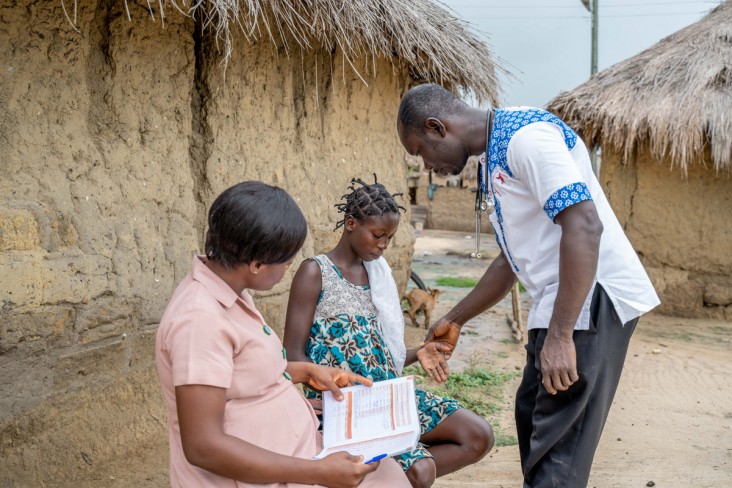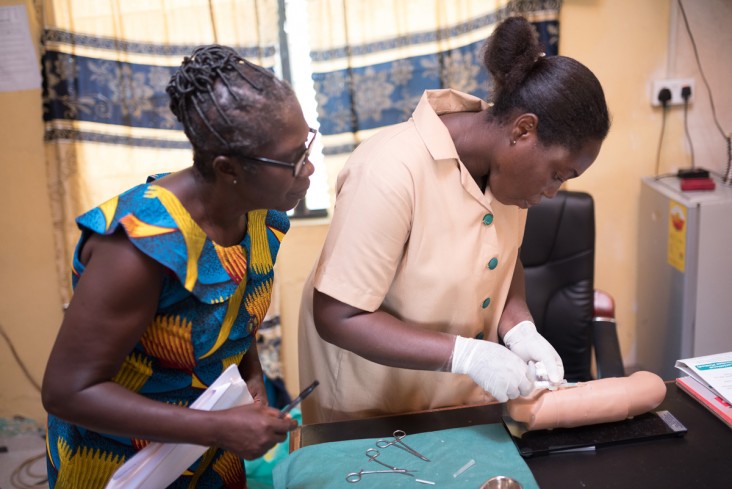Speeches Shim

In Ghana, USAID facilitated cross-facility collaborations between health workers to share experiences and skills, describe challenges to service provision, and identify solutions, which contributed to a 33 percent reduction in institutional maternal mortality, 41 percent increase in family planning service utilization, and 28 percent reduction in stillbirths among participating districts in just a year and a half.
Many rural clinics around the world lack funding to train staff on quality service delivery. In Ghana, USAID provided a multi-pronged approach to improve the quality of maternal and child health care, including training staff to know when to refer women for more specialized care.
As one prong of this approach, USAID helped create networks of preferred primary care providers. These networks serve as a platform for connecting health providers to exchange knowledge, conduct regular consultations on major issues, build staff skills, and encourage wider adherence to quality standards of care. The networks help connect rural primary health facilities with district hospitals, enabling mentoring between community health workers and more experienced providers at hospitals.
“I did not know much about managing curative cases, but now, I can manage cases that before I would have referred. With the network, I get support from colleagues who can help me address questions or challenges I’m less familiar with; together we are able to attend to mothers quickly, and they don’t have to wait long,” said a community health nurse in one of the networks.
The networks also help health care workers determine when to refer a woman for more specialized or technical care by establishing better processes for evaluating a patient’s medical needs and by standardizing documentation of patient information. A WhatsApp platform was created to support these networks with appointed referral focal persons that ensure feedback and more coordinated follow-up. After just 18 months, there was a rise in referrals and improved quality of care in target districts. In the South Dayi district of Ghana these networks resulted in zero maternal deaths in 2018 and 2019.
A midwife in one network said, “I feel empowered by the network because, when I encounter a problem, I know I have back up support to help me manage it. I just have to call the Physician Assistant or a colleague midwife in the network—or even receive instruction on the WhatsApp platform—to receive guidance on what to do before referring a client. The network has helped us improve relationships with other staff because we support each other, and it's helping us provide higher quality care for our clients.”
Driving Sustained Quality Improvement
As part of the multi-pronged quality improvement effort, USAID funded training for government staff to serve as “Improvement Coaches” who specialize in specific health areas and serve districts as champions and facilitators of quality improvement. Frontline health workers were also trained in quality improvement approaches and benefit from continuous mentoring with the “Improvement Coaches.” To date, more than 1,400 healthcare providers from five regions of Ghana have been trained in health data and its use for maternal and child health and nutrition decision making.
USAID’s support for these quality improvement efforts in Ghana has contributed to a 33 percent reduction in institutional maternal mortality, 41 percent increase in family planning service utilization, and 28 percent reduction in stillbirths among participating districts in just a year and a half. Today, the preferred primary care provider networks largely function autonomously with limited technical assistance and financial resources from USAID. The Government of Ghana is in discussions about how best to support a scale-up of these networks across the country. USAID is helping countries like Ghana take charge of improving the quality of their health care and strengthening the health system, thereby helping them progress along their Journey to Self-Reliance for health.

Download the PDF version of this story. [PDF, 1.7MB]

Comment
Make a general inquiry or suggest an improvement.